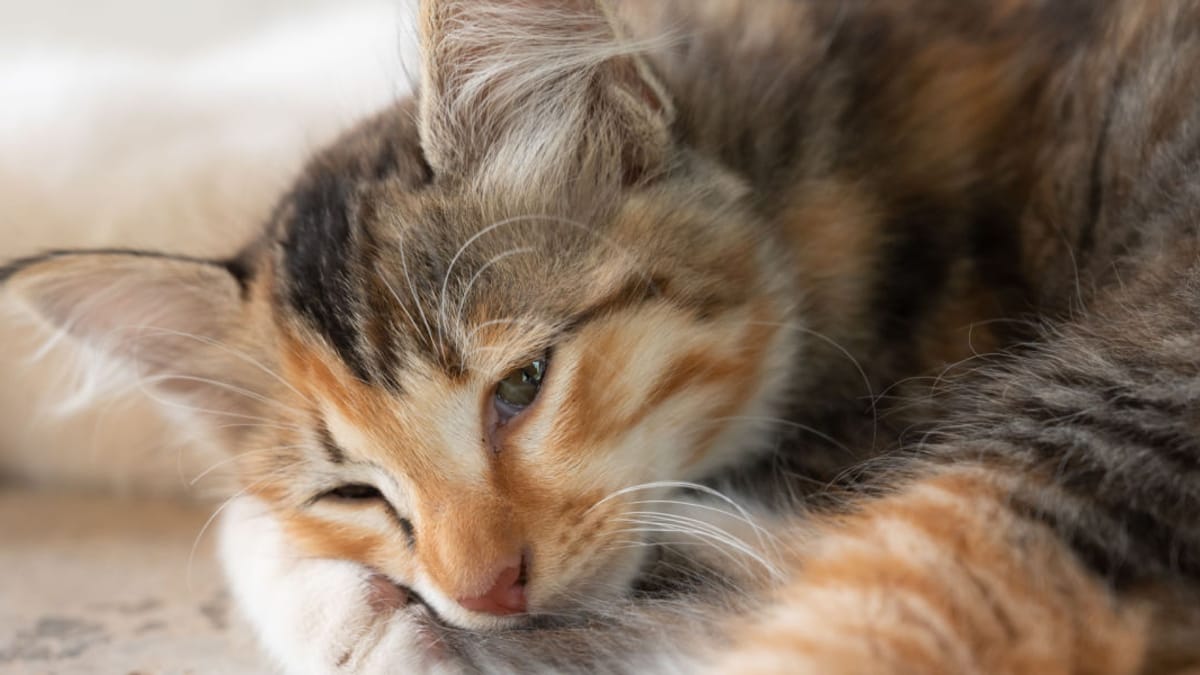The cystitis in the cat, as in humans, is a disorder that affects the urinary tract. It is an inflammation – different from a urinary infection – which, due to the pain and discomfort it causes, must be treated promptly.
If your cat pees away from the litter box and/or moans while urinating, he could be suffering from cystitis. Let’s find out more about this urinary tract disorder.
How to understand if the cat has cystitis?
I symptoms of cystitis in cats they are different and can appear all together or individually.
In the event that our cat shows one or more of these signs, it is important to consult a veterinarian immediately and avoid putting home remedies into practice. These symptoms are:
- great difficulty urinating (the cat gets into position, but can only make a few drops, goes back and forth to the litter box, but cannot pee, etc.);
- presence of blood in the urine;
- a strong smell of ammonia coming from the litter box;
- lethargy;
- tense and aching abdomen;
- in rare cases vomiting and anorexia;
- the cat drinks a lot;
- does not urinate properly, meows when urinating;
- he constantly licks his genitals.
Causes of cystitis in cats
We have talked about the symptoms so far, but what are the causes of cystitis in cats? If the cat suffers from cystitis the causes can be multiple and must all be examined by the vet to discover the definitive one and fight it with the right treatment. Among these we mention:
- kidney stones;
- urinary infection;
- inflammation due to taking medicines;
- a surgical wound;
- urinary tract cancer;
- stress;
- congenital malformation.
Attention: a cat that drinks a lot and urinates little can also suffer from a disorder other than cystitis. In fact, even diseases such as hyperthyroidism, liver insufficiency or renal insufficiency can be the cause of little urination.
Food for cats with cystitis
Per avoid relapses must implement a specific diet to reduce the risk of stone formation and protect the animal’s bladder.
It will therefore be necessary to avoid foods with a high concentration of oxalate and / or calcium (elements that can favor the development of kidney stones), foods that are too dry or low in protein and phosphorus. It is also important to always make fresh water available so that our furry friend can cool off properly.
Small tip: some cats love to drink from the tap and with running water fountains (whose jet of water is constant and regenerates automatically) our feline will be more inclined to drink.
Diagnosis of cystitis in cats
To diagnose cystitis in cats, the vet will first perform a clinical examination of the cat by feeling its abdomen for signs of pain. Later he will make a urine collectionwhich will then be analyzed in search of the possible presence of bacteria, stones, etc.
It is possible to complete the diagnosis by having the cat undergo an X-ray (practiced in most cases to look for stones), an ultrasound (to look for any abnormalities) and/or blood tests.
Which antibiotic for feline cystitis?
As for the treatment of cystitis in cats, the veterinarian, after finding the cause of the disorder, will try to clean the animal’s bladder and administer targeted treatments to manage the inflammation. For this reason, first of all, an anti-inflammatory treatment will be prescribed to the animal to manage the pain of the cat.
It is possible, in case of stones or tumors, to practice a surgery to remove the disturbing body. However, hospitalization and surgery are implemented in the most serious cases.
How to cure cystitis in cats naturally?
Alongside a balanced diet and pharmacological treatment, always under the advice of the veterinarian, we can administer natural aids to our domestic tiger to alleviate its pain.
It is advisable to tempt the cat with herbal teas based on bearberry, mallow and corn leaves capable of purify the bladder and reduce inflammation of the urinary tract. In case of alteration of the intestinal bacterial flora it is advisable to administer lactic ferments to the cat.
How long does cystitis in cats last?
Cystitis in cats is a disorder that can last for a very long time, especially if accompanied by a urinary blockage. With the help of medical care and adequate nutrition, however, within one or two months the cat can recover.
Attention: to avoid the risk of relapses, ensure that the cat always has fresh water available and that it follows a balanced and correct diet.
—
Article reviewed by:
Francesco Reina
Veterinary assistant

